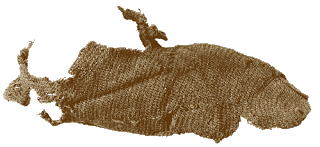The Coppergate Sock
This sock was found as part of the Coppergate excavation in York, England. It was associated with a 10th century post and waddle house, and so far is the only example of nalbinding found in England (perhaps off the foot of a traveller???). Analysis of the sock suggests that using a bone needle, the maker started at the toe and worked their way out from there. There is also evidence to suggest that it had been patched or repaired in some way. It has not been determined what colour it may have been, but it is believed that it had a red band around the ankle area.
Sources: http://jorvik-viking-centre.co.uk/about-jorvik/gallery/
Wild, John P., 1988. Textiles in Archaeology. Aylesbury, UK: Shire Publications
The Åsle Mitten
As are so many finds from this period, this mitten was found in a stray context on a farm in Sweden. In 1913, a farmer was digging up some peat and came across this piece, unfortunately, damaging it with his spade in the process (see just above and to the right of the thumb). The stitch used on this mitten is a bit different than the traditional Oslo stitch, and as such was deemed the Åsle stitch, in honour of where it was found. It is believed to be from the 16th or 17th century and is currently housed at the Åsle Tå museum in Sweden.
Source: http://www.asleta.se/en/kategori/19/asle-mitten.html
4th or 5th Century socks from Egypt
Nalbinding is actually thought to have originated in the Middle East or North Africa, with the earliest finds using our technique dating back to 6500BC!!! These socks were found in Egypt and date to around the 4th or 5th century. These socks were likely meant to be worn with sandals, as indicated by their split toe, something I haven't come across when searching the Scandinavian artefacts.



No comments:
Post a Comment